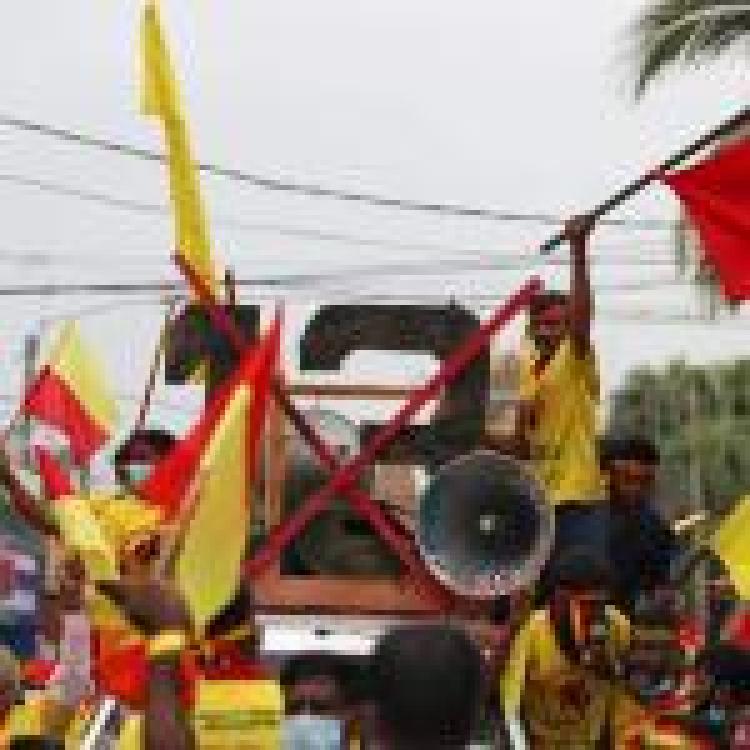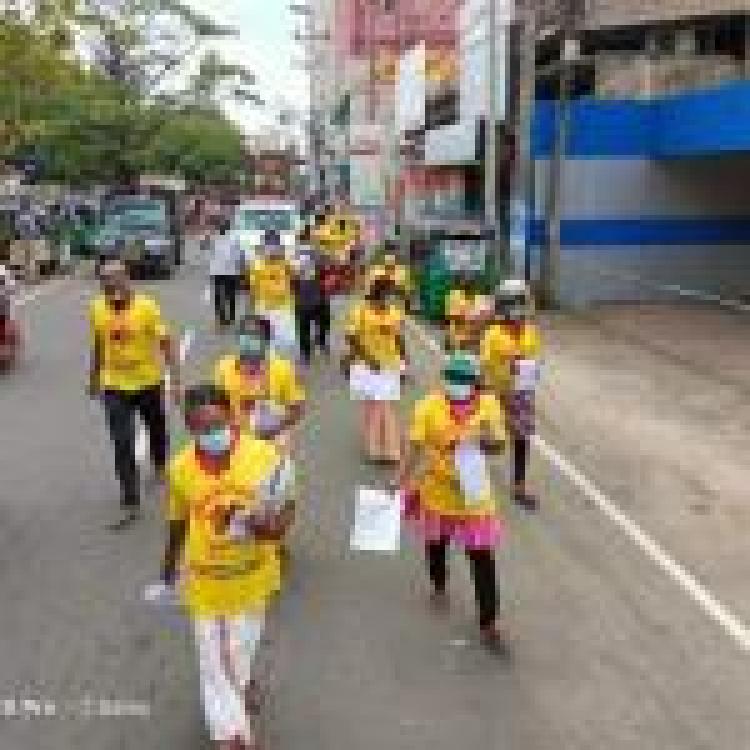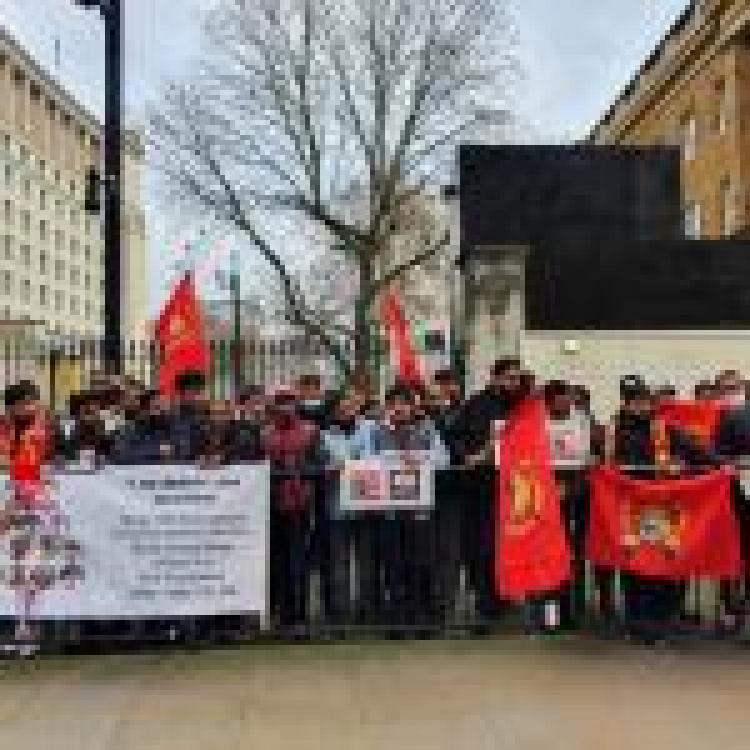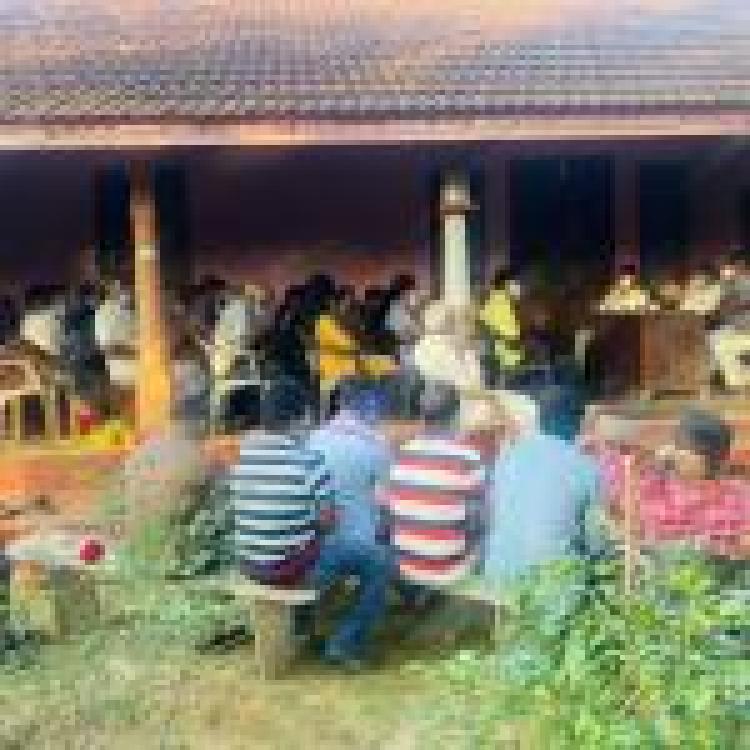“Ever since the 13th Amendment was passed 34 years ago, the Tamils have rejected it in total,” said Tamil parliamentarian Gajendrakumar Ponnambalam as he warned Tamil leaders against voting for a new constitution in Sri Lanka that may include it, labelling the move a “death knell”.
Ponnambalam’s party, the Tamil National People’s Front (TNPF), has firmly opposed recent moves by other Tamil parties calling on India to ensure the full implementation of the 13th Amendment. In an interview with the Tamil Guardian, he outlined his party’s stance that the provisions of the amendment, initially passed in 1987, were wholly embedded in Sri Lanka’s unitary state structure and that its implementation would create a setback in the political struggle for Tamil self-determination.
“The whole problem with the Sri Lankan constitutions has been that they are unitary in character and unlike other unitary states, in Sri Lanka, the way in which the judiciary has interpreted the unitary character is very unique,” Ponnambalam stated explaining that “it is an extremely narrow interpretation that is completely opposed to the notion of devolution or power-sharing, and has been linked with the notion that Sri Lanka is essentially a Sinhala Buddhist state and that this island, and the Sinhalese people being the chosen people, are to protect Buddhism in its purest form.”
“When that is the background on which the state structure is modelled, then obviously, all aspects of that state are going to give the interpretation such that Sri Lanka only belongs to the Sinhalese Buddhists, and it is not meant to be shared by anybody else. And all else or whoever else, essentially live at the mercy of the Sinhalese Buddhists. That interpretation has actually found very strong ground in Sri Lanka’s jurisprudence with regards to the unitary state. So, the 13th Amendment falls well within the concept of a unitary state.”
“Ever since the 13th Amendment was passed 34 years ago, the Tamils have rejected it in total,” Ponnambalam asserted, highlighting that “the main [Tamil] political party that had a resounding mandate in '77, the TULF, at that time, wrote to the Indian Prime Minister Rajiv Gandhi… saying that India must intervene and stop the 13th Amendment from being passed in Parliament… because it didn't come anywhere close to addressing Tamil concerns, given the sort of losses that had taken place at that time”, which meant that “it was not even considered a starting point [then]”.
.jpeg)
Ponnambalam campaigning agaisnt the 13th Amendment last month.
He went on to criticise the Tamil National Alliance (TNA), a coalition of Tamil parties that recently wrote to New Dehi requesting that the 13th Amendment be implemented.
“Thirty-four years later, those same people - [TNA leader] Mr Sampanthan was one of the signatories as the vice president of TULF, when they wrote to Rajiv Gandhi - are doing a complete U-turn and asking that the 13th Amendment be implemented. That means that [they] have accepted.”
“To say that they want it implemented very clearly shows that there is this danger that these Tamil parties that are aligned with India very closely, have in fact settled for the 13th Amendment as the basis for a solution for Sri Lanka.”
“In fact, we left the TNA some 12 years ago in 2010 precisely because the TNA leadership at that time on India's command accepted the 13th Amendment as the basis for a solution,” he continued, outlining one of the reasons he broke away from the TNA to form the TNPF.
“They did not say it out loud. We, of course, were privy to what was going on within the party. So we left, we came out of the party we've been telling for the last 12 years that the TNA is all about the 13th amendment and when the opportune time arises, they will in fact, accept it. That's what's happening now.”
Colombo’s rule
.jpeg)
A rally in Jaffna last month calling for Tamil self-determination
Ponnambalam went on to dismiss the notion that the 13th Amendment could be a “starting point” for Tamil aspirations and outlined fears that accepting it could erase the fact that there is ethnic conflict on the island.
“Despite after 13 years since the war ended, the international community particularly the West and India, have to pay lip service to finding a solution to the ethnic conflict, precisely because ever since the British left Sri Lanka, and Sri Lanka claims independence, all three constitutions of “independent Sri Lanka” were rejected by the Tamils,” he explains, detailing the history of Sri Lanka’s constitution.
“Tamils have never been a party to the formation[s],” he added.
And despite the Rajapaksa’s claims that the conflict on the island was “only a terrorist problem in Sri Lanka,” other countries have still had to “pay lip service” to the ethinic conflict, said Ponnambalam. But he warned that could change.
“Tamils taking part in the constitution making process and actually supporting it is fundamental and crucial to close the chapter on the ethnic conflict,” he continued.
“The Rajapaksas have said very clearly soon after the war that the 13th Amendment is going to be the basis for a solution. The chief opposition party leader Sajith Premadasa has said that the 13th Amendment is the basis for a solution. The JVP, after opposing it initially because of India's intervention, have accepted the 13th Amendment as a basis. The most ardent Sinhala nationalist in opposition Champika Ranawaka, who has ambitions of being a presidential candidate at the next presidential elections, as recently as last week said that the 13th Amendment and the Provincial Councils are the basis for a solution… India is saying that the 13th Amendment is the solution.”
If Tamil representatives were to accept the 13th Amendment now, “there is a danger that the Sinhala Buddhist nationalist agenda would very conveniently be fulfilled,” Ponnambalam said.
“The moment a majority of the [Tamil parliamentarians] representing the North-East, support that new constitution… we'll have a constitution that has come into effect with the Tamils consenting. And it will effectively be a conflict transformation process where no longer is there going to be an ethnic conflict… Whatever the Tamils scream about thereafter saying, ‘Oh, well, we never really accepted the 13th Amendment as a solution, it was just a starting point’. You can say whatever you want, but the constitution of the country has been passed for the first time with the full support [of the] majority of Tamil parliamentarians”.
This may have international ramifications, he warned.
“Whatever positions that these countries thereafter take is not going to be on the basis of Tamils fighting for their rights,” Ponnambalam noted, “because the right has been addressed through the Sri Lankan constitution.”
“The Tamils will just have to completely be at the mercy of major powers and their geopolitical ambitions. Which we obviously don't think is the way to go.”.
A federal arrangement
Instead the TNPF calls for some fundamental facts to be recognised, starting with acknowledgement that a genocide is taking place - and not just in the killing of Tamils, argues Ponnambalam
“The genocide is something that is bigger than that,” he said. “It is the systematic dismantling of the existence of the Tamils as a nation.”
“We have our own language. We have our own traditional homeland in the North-East. We have our own culture. And then you also have the Tamil being able to sustain an economic situation that allows them to exist as a collective. All of these conditions give you the position of nation.”
Recognition of Tamil nationhood therefore “can be the only solution”, he continued. “And our belief is that for a distinct nation, to live with another nation within one country, it has to be a federal arrangement.”
“There is also legitimacy with this argument. In fact, there is far more legitimacy today than maybe say 1951 when the ITAK, in the first national convention, passed their very first resolution which said that the Tamils are a nation. I think there's far more credibility with regards to saying that you know, we need a federal arrangement that recognises a plurinational Sri Lanka where Tamil nationhood is also recognised.”
“During the war the international community sort of tried to blame the LTTE saying that they backtracked on federalism,” Ponnambalam adds. “In their own view, they felt that the LTTE was not committed to a federal arrangement and they felt that the LTTE was only interested in a separate state… Today, there is no LTTE.”
“Over 90% of the Tamil people voted at the last elections and at previous elections have voted for a mandate to recognise the North-East as a Tamil nation and for a federal arrangement,” he continued. “So our view is that a federal arrangement is something that cannot be compromised. The recognition of Tamil nationhood will be something that cannot be compromised.”
“The goal is to hold these people to account,” the TNPF leader responded, when asked about the recent campaign the party launched across the North-East, with thousands attending a rally in Jaffna last month.
“The goal is to say that the mandate was in fact for the recognition of Tamil nationhood and a federal arrangement that allows the Tamil nation to enjoy the right to self determination without dividing the country. That is the mandate that all the parties here actually got when they went before the people.”
Ponnambalam was speaking of Tamil parliamentarians from both the TNA and TMK, who he fears may vote in favour of a new Sri Lankan constitution - a move he once more warned would be a “disaster”.
Clearing the air on India
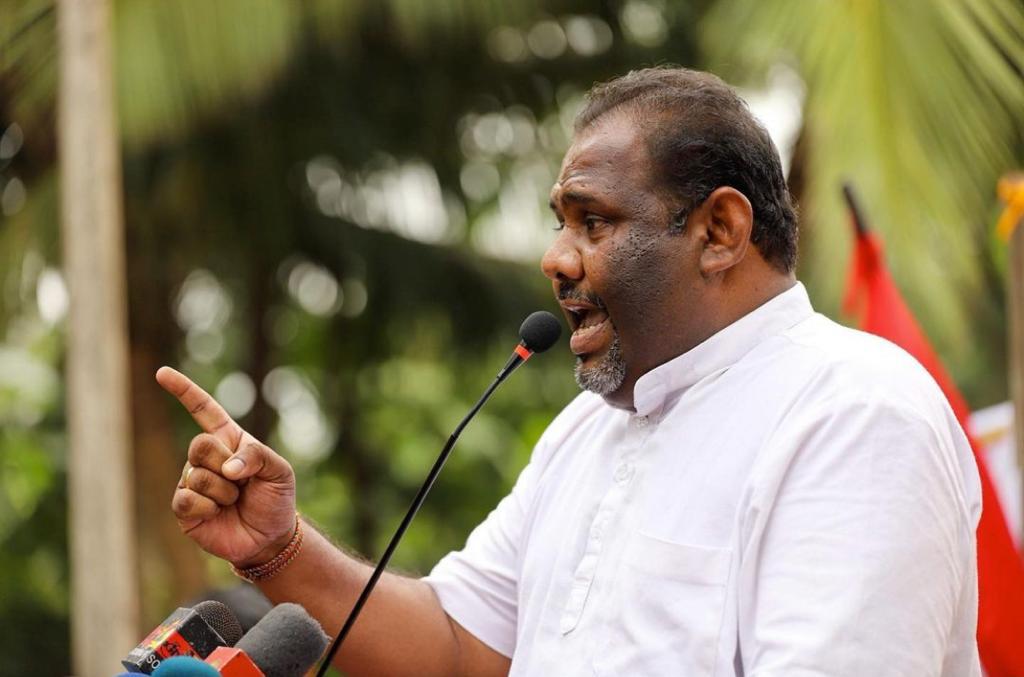
Ponnambalam speaking at the rally in Jaffna last month.
The TNPF leader also wanted to “clear the air” with regards to his party’s position on India, telling the Tamil Guardian that they “have always stated that we don't want a geopolitical battleground being made of the Tamil homeland”.
“Our view has always been that whilst we welcome everyone and whilst we want to be friends with everyone, certainly, if someone's presence here is going to have some geopolitical implications, with regards to national security for India then we don't want we don't want such a presence here,” he clarified. “That is a unilateral position that the TNPF takes.”
And although he says his party has “some serious issues” with the 1987 Indo-Lanka Accord provisions being seen as the solution to the Tamil ethnic conflict, he adds that “the Accord also consists of annexures which address India's national security concerns and we have always maintained that purely because of India's national security concerns being addressed through the accord, we will not reject the Accord outright”.
“But at the same time, we're very clear that India cannot prescribe solutions,” he adds, stating that it is only the victims themselves who can “because it is they who have to feel secure”.
“No one should be telling the Tamil people, after the genocide that we faced in particular, what we should accept and what we should know.”
He went on to call on India to accept the Tamil demand for federalism and hit back at claims that those demands may make the Tamil people seem “anti-Indian”.
“That is not, in fact, the case,” he said. “We are not anti-Indian. We're not anti anybody… If there is some country that we don't want, having a presence here [in the North-East] it is in fact, because of India's national security interests.”
“So I think India must play its part. I think India must come and meet us at the halfway point."
"We've done enough to be quite categorical with regards to whose side we are when it comes to the national security concerns of India.”
_____
See the full video interview with Gajendrakumar Ponnambalam above and here.

